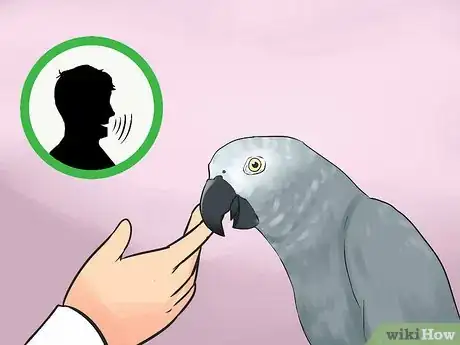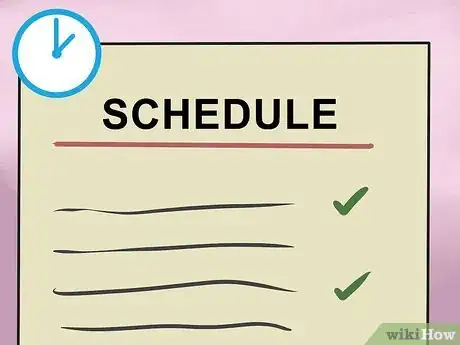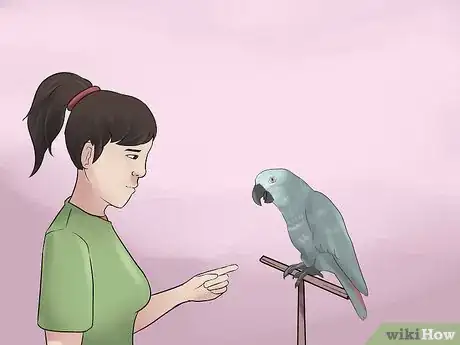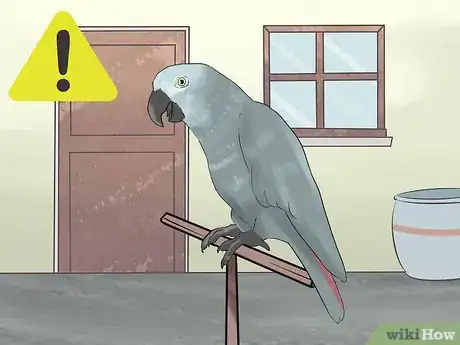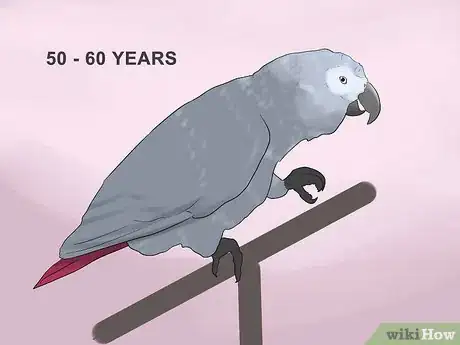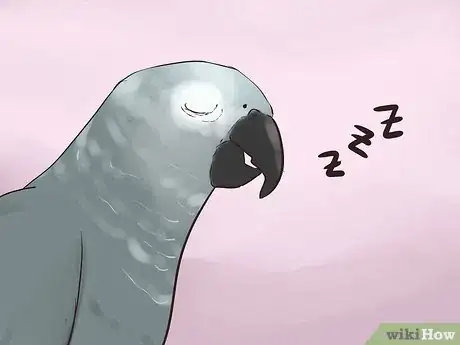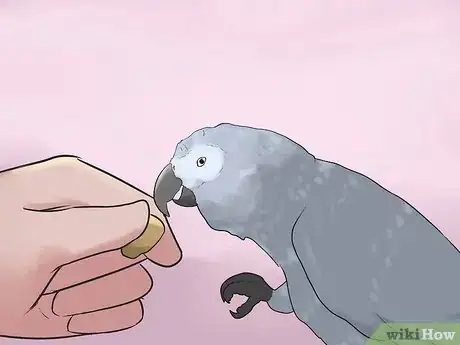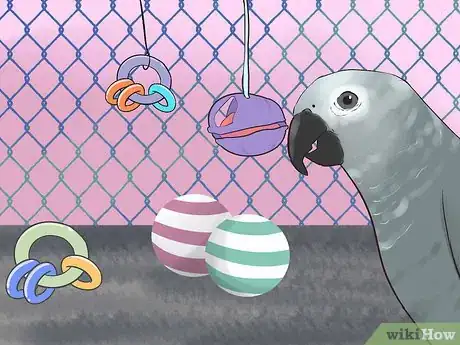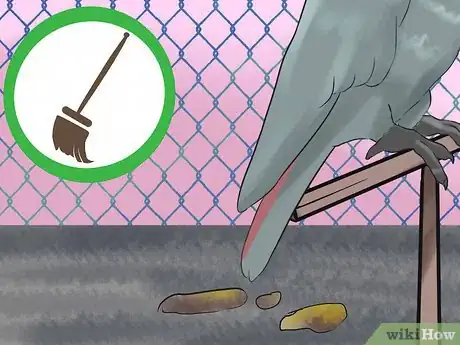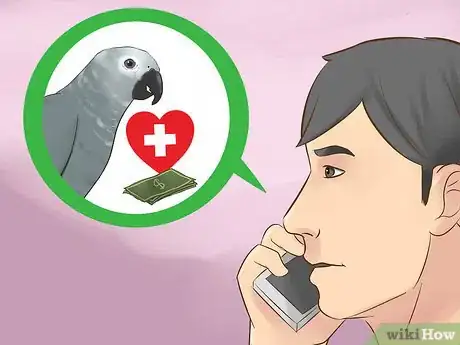This article was co-authored by Melissa Nelson, DVM, PhD and by wikiHow staff writer, Danielle Blinka, MA, MPA. Dr. Nelson is a Veterinarian who specializes in Companion and Large Animal Medicine in Minnesota, where she has over 18 years of experience as a veterinarian in a rural clinic. She received her Doctor of Veterinary Medicine from the University of Minnesota in 1998.
There are 10 references cited in this article, which can be found at the bottom of the page.
wikiHow marks an article as reader-approved once it receives enough positive feedback. In this case, 96% of readers who voted found the article helpful, earning it our reader-approved status.
This article has been viewed 29,289 times.
African grey parrots are known for their ability to talk or mimic sounds. They are social birds that can make great companions, but they also come with a lot of needs. Since parrots are intelligent and nervous, owners need to be prepared to give their birds a safe, predictable, and loving home. You'll know if an African grey parrot is right for you after you know what to expect, commit to providing care and attention, and calculate the costs of owning the bird.
Steps
Knowing What to Expect
-
1Expect an intelligent, sociable pet. African grey parrots are one of the smartest animals that you can keep as a pet.[1] Their reasoning skills are similar to those of a 3-year-old child, making them inquisitive and delightful to interact with.[2] However, like an actual toddler, they can be a handful. You'll need to ensure that your bird is well-stimulated to keep it healthy and happy.
-
2Prepare for a bird that talks. African greys can learn to speak with training and can mimic human speech. This skill is one that makes the birds really popular, but you'll need to work with your bird to help it learn to mimic. Additionally, the skill range can vary across individual birds.[3]Advertisement
-
3Find space for a large cage. Your bird will spend much of the day in its cage unless you can supervise extended stays outside it. Because of this, the cage must be large enough for the bird to spread its wings and fly around. The cage should be at least 4 feet (1.2 meters) tall, 2 feet (.6 meters) wide, and 3 feet (.9 meters) long.[4]
- The space should allow the bird access to natural sunlight, but away from drafts.
- You also need to find a place that isn't too noisy or susceptible to a lot of disruptions, which could upset your bird.
- Your bird will want to be near the action in your home, so the living or dining rooms are a common spot for a cage. Just make sure that one or two sides of your bird's cage are against a wall so that it feels secure.[5]
-
4Plan for a time-consuming pet. Your bird will require hours of daily attention and care. Additionally, African greys need a schedule and routine, so one may not work for you if your schedule varies, you work long hours, or you travel a lot.[6]
Providing Care and Attention
-
1Spend time with your bird each day. You'll need to spend at least an hour each day playing with your bird, talking to it, and letting it bond with you. Ideally, most birds prefer spending more than an hour with their owners. Consider if your schedule will allow enough time to spend with your new pet.[7]
- African greys are social birds, so you need to bond with your bird. If you don't, then your bird can get stressed and start plucking out its feathers.
- You can also keep your bird socialized by purchasing a pair of opposite-sexed African greys.
-
2Feed your parrot mostly pellets with a small number of nuts and seeds. The bulk of your parrot's diet should be made up of pellets. This will ensure that your parrot gets all of the nutrients he needs. However, you can complement your parrot's diet with a small amount of seeds and nuts each day.[8]
- Avoid giving your parrot seed mixes because your parrot will pick out the pieces that he likes best and avoid the rest.
-
3Plan to cut up fresh vegetables and fruit to complement your bird's food. African grey parrots need to eat vegetables and also enjoy eating fresh fruit. You'll need to prepare the food by cutting it into small pieces first. This must be done daily to ensure your pet's needs are met.
-
4Prepare to give your bird supervised exercise outside its cage daily. Your bird will need to spend time out of its cage every day so that it can stretch its wings and avoid boredom. This must occur while you're at home because it's dangerous for the bird to be left outside its cage alone.[11]
- Take steps to keep your bird safe while it's out of its cage, such as covering exposed wires, turning off fans, removing breakables, removing houseplants, and covering windows, mirrors, and see-through doors. If a room is not bird-proof, shut the door. Don't allow other pets or small children to be with the bird.
- Consider how much time you have in your schedule to see if you will be able to supervise your bird.
- Know that your bird will have a routine, so you will need to accommodate the bird.
-
5Plan for your bird to live up to 50 or 60 years. African greys have long lifespans, so buying one is a commitment. You'll enjoy many years with your bird, but their companionship also comes with responsibility.[12]
-
6Expect your bird to sleep from sunset to sunrise. African greys need 10-12 hours of sleep. In the wild, they sleep from dusk until dawn. If you work late, then it could be difficult for you to give your bird the attention it needs while ensuring it can follow a schedule to keep it healthy.
- You may need to plan ways to adjust your bird's sleep schedule, such as putting it to bed late and then using cage covers or drapes to allow it to sleep past sunrise.
- Consider how these needs will fit into your schedule.[13]
-
7Commit to following a routine. African greys can be nervous and are resistant to change. Getting away from your bird's routine can cause it to become upset and aggressive. To keep your bird happy, you'll need to keep it in a stable, predictable environment and follow a schedule.[14]
-
8Plan to purchase lots of bird toys. African greys need tons of stimulation, so you'll need to supply plenty of toys for your bird, including interactive toys. A bored bird will become aggressive and can start picking its feathers, so it's important that you as an owner keep it stimulated.[15]
- You can save money by cycling your bird's toys. To cycle, you put toys into two or more groupings. Place one grouping into the bird's cage at a time. When the bird starts to get bored with those toys, take them out and replace it with another group. Then place the retired toys aside to rotate back in later. Eventually, they'll be "new" again.
-
9Expect to clean often. Like other birds, African greys are very messy. They poop a lot and like to tear up toys, paper, and wood as part of their play. You will need to clean the cage daily, provide fresh food and water, and scrub perches, toys, and other cage items. Your bird may also cause additional messes outside of its cage, including poop.
Calculating Your Costs
-
1Price the cost to set up your bird habitat. Your African grey will need to spend a lot of time in its cage since it can't be left out alone. You'll need to invest in the cage and supplies to keep the bird happy and entertained. The set-up costs quickly add up. The average cost of setting up a habitat for a large parrot like the African grey ranges from $1,468 to $11,010.
- Your bird cage will need perches, branches, toys, and interactive features.[16]
- Visit your local pet shop or browse online to gather the actual prices that you will pay. You may even be able to find gently used pieces through the local classifieds.
-
2Check the prices of African grey parrots. African greys can be expensive. The average price range is $1,000-1,500, so buying one is an investment.[17]
- You could look for someone who is selling their own pet for a lower price, or you could check local animal shelters or veterinary clinics for surrendered birds.
- Buying from a breeder could allow you to get a younger bird, which will be easier to train. Older birds may have trouble learning to speak or learning new words.
- Older birds are more stable, which can be good for new owners. You may also find older birds that are fully trained already. Some of these birds can already speak well.[18]
- You will need to quarantine any new bird for several weeks after you bring it home.
-
3Add up recurring costs. After you own your bird, you'll need to purchase things like food, treats, cleaning supplies, cage liners, and new toys. Yearly costs for owning a large parrot like the African grey usually range from $650 to $1,275, which can take a bite out of your budget.
- Check the prices of common supplies at your local pet supplier or via online retailers.
-
4Plan to take your parrot to the vet. African grey parrots are susceptible to ailments such as kidney and liver issues, so you need to take your parrot in for check-ups at least once a year. Depending on your parrot's health, it could require more visits.[19]
- Contact a local avian vet to get a cost estimate for annual visits and care.
-
5Make a budget and determine if you can afford an African grey. Add up the costs of potentially owning a parrot using the prices you've collected. Look at your household budget to see if the recurring costs of owning your parrot will fit. Now that you know how much your bird will cost, you can decide if you can afford the bird.
- If an African grey doesn't fit your budget right now, remember that people do sometimes need to rehome their birds, so you may be able to find a good deal by looking for owners who need to sell or give away their bird.
Warnings
- African greys require a lot of time and attention, so only get one if you can meet the bird's needs.⧼thumbs_response⧽
References
- ↑ http://www.african-grey-parrot.com/
- ↑ http://www.smithsonianmag.com/science-nature/african-grey-parrots-have-the-reasoning-skills-of-3-year-olds-15955221/
- ↑ http://www.avianandexotic.com/care-sheets/birds/african-grey/
- ↑ http://animals.mom.me/everything-need-caring-african-grey-parrots-8739.html
- ↑ https://african-grey-parrot.com/cage-and-environment/
- ↑ http://www.avianandexotic.com/care-sheets/birds/african-grey/
- ↑ http://animals.mom.me/everything-need-caring-african-grey-parrots-8739.html
- ↑ https://vcahospitals.com/know-your-pet/african-grey-feeding
- ↑ http://animals.mom.me/everything-need-caring-african-grey-parrots-8739.html
- ↑ http://www.avianandexotic.com/care-sheets/birds/african-grey/
- ↑ http://animals.mom.me/everything-need-caring-african-grey-parrots-8739.html
- ↑ http://animals.mom.me/everything-need-caring-african-grey-parrots-8739.html
- ↑ https://petcentral.chewy.com/what-you-need-to-know-about-a-parrots-night-and-day-cycle/
- ↑ https://www.petcha.com/top-10-pet-african-grey-parrot-questions-answered/
- ↑ http://animals.mom.me/everything-need-caring-african-grey-parrots-8739.html
- ↑ http://animals.mom.me/everything-need-caring-african-grey-parrots-8739.html
- ↑ http://www.peteducation.com/article.cfm?c=15+1840&aid=2268
- ↑ http://www.african-grey-parrot.net/adopting-an-older-parrot/
- ↑ http://animals.mom.me/everything-need-caring-african-grey-parrots-8739.html
About This Article
If you're not sure if an African grey parrot is right for you, keep in mind that they're highly intelligent and social, so they require a lot of attention and stimulation. If you don't have several hours a day to give your pet attention, you might want to consider a bird that's less demanding. Since African grey parrots are big birds, make sure you have enough space to keep a cage that's at least 4 feet tall and 3 feet long. They can also be expensive pets to own, costing thousands of dollars up front and then hundreds of dollars a year to take care of, so it might not be a good choice if you're on a budget. For advice from our Veterinary co-author, like how to take care of an African grey parrot, keep reading!

